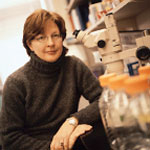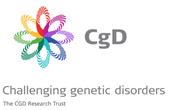|
Research
Do you know that using the Jeans for Genes fundraiser, over $50 million has been raised to help benefit children with a range of genetic disorders?
Funding research into the causes and cures of genetic disorders is our key aim. Children suffering from one of a number of conditions will benefit directly from the research. Other children will benefit in the longer term, as the knowledge gained can be applied more widely.
Why should I help?
Because so much of the state of the art research on genetic disorders is being done in the USA.
We sponsor work in the USA.
Here are some examples that are having a major impact in driving forward improvements in treatments for one genetic disorder but has far reaching implications for other conditions.

|
Investigating treatments for painful abscesses in CGD
Dr Brian Cobb and Miss Colleen Lewis, Case Western Reserve University School of Medicine, Ohio, USA. $115,000 over 2 years.
This project has helped develop treatment for abscess formation in CGD. Abscesses are the immune system's way of quarantining harmful microbes within the body. They are very painful and often require surgical drainage because they prevent antibiotics from working.
Abscesses can also serve as pools of infection that if not properly got rid off can often lead to larger, more serious infections. The work tested a novel drug that was shown to the effectiveness of antibiotics in treating infections.
This work will dramatically improve the long-term health of people with CGD and many others who have severe infections.
Success brings success
Since this award Dr Cobb has received a National Institutes of Health Innovator Award contributing $2.35M to his research program. He says:
"Your organization believed in me from the beginning and helped me on the way to this important award". |

|
Testing improved gene therapy tools to treat CGD
Professor Mary Dinauer, Herman B Wells Centre for Paediatric Research at the Indiana University School of Medicine, USA. $20,000 over one year.
This project is part of a collaborative program of research taking place in Europe and the USA. The aims are to test how well the new gene CGD delivery tools work to fight off infections in animal models that mimic human CGD. The studies are an essential requirement before new clinical trials can take place.
This project will contribute to the development of gene therapy procedures for many genetic conditions.
"Pre-clinical studies and clinical trials require a great deal of work, and collaborative research helps to more rapidly develop effective strategies for gene therapy of CGD and other genetic conditions". |

"The CGD Research Trust, through Jeans for Genes, provides critical funding to explore promising ideas with strong translational potential to benefit patients with a rare disorder" |
Development of a vaccine against fungal infections and strategies to help fight inflammation in CGD
Dr Brahm Segal, Departments of Medicine and Immunology Roswell Park Cancer Institute, Buffalo, New York. $169,000 over 2 years.
Infection caused by fungi is a serious cause of illness and mortality for people whose immune system is not working properly. This project helped pave the way to developing a vaccine against fungal infections. Such a vaccine would give vulnerable individuals long-lasting protection and would have a significant impact on the quality of life and survival of many numbers of people.
Funds are also being used to understand more about how the enzyme affected in CGD regulates inflammation and the body's response to infections. In a collaborative study with an Italian group Dr Segal recently made an important breakthrough in understanding how inflammation that causes internal abscesses in CGD could be switched off and how infections could be resolved.
Success brings success
The National Institutes of Health has since awarded a five-year, $2.2 million dollar research grant to Roswell Park Cancer Institute (Buffalo, New York) to continue studying the enzyme affected in CGD as a critical regulator of inflammation.
The work also has broader implications. Dr Segal explains,
"How the enzyme affected in CGD regulates inflammation is centrally relevant to CGD, but it is broadly important to disorders of inflammation such as autoimmune disorders and cancer".
"Without support from the CGD Research Trust, we would not have been able to generate the preliminary results that led to this grant being funded" |
We would like to see more cutting edge projects in the USA. We are asking you to join us in using Jeans for Genes as a fundraiser to help your charity. To learn more, please get in contactwith us.
How else can I help?
Please make a donation today |
|
|


